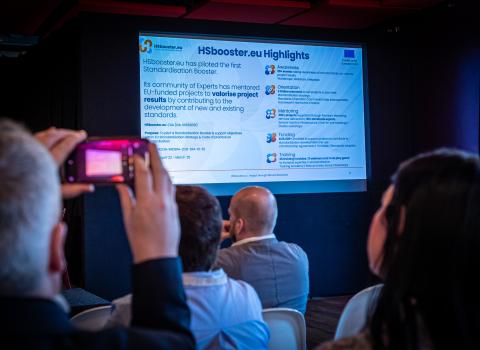If Europe wants radical innovations, fast-moving entrepreneurs and paradigm-changing start-ups, it can’t rely on traditional, top-down policies. It has to change attitudes toward entrepreneurship and failure and nurture the ecosystems that drive new ideas to market.
“We work with good ideas that flow from the bottom up,” said Tuula Teeri, president of Aalto University speaking on 3 December at a conference of the Science|Business Innovation Board in Brussels entitled, “Can EU = Entrepreneurship Union? New Approaches to Helping Small Companies Grow.”
Finland’s Aalto University has become an entrepreneurial hotspot since it was founded in 2010 to foster innovation. Start-up Sauna, a student initiative, has mushroomed into a Nordic hub for coaching would-be entrepreneurs that sends the best-in-class to Silicon Valley. Aalto is also home to Rails Girls, a workshop launched by an Aalto student to helping women learn basic computer programming and “build their ideas on the web” which went viral spawning global communities of women coder entrepreneurs from Beijing to Brazil.
“Things can happen so quickly,” said Will Cardwell, who founded the Aalto Center for Entrepreneurship, noting that entrepreneurial role models and success stories can seize the imagination of students overnight and spur huge waves of activity. “There’s an organic nature to this. We invested about €20,000 in Rails Girls 18 months ago, and now it is a self-sustaining non-profit grassroots movement that is active on 5 continents, and has trained several thousand young women on how to code.”
Horizon 2020
Fast is what Europe wants – and needs. Economic crisis and unemployment have put innovation and growth at the top of the EU agenda in Horizon 2020, a proposed seven-year R&D programme running from 2014-2020. Under Horizon 2020, more money – at least 15 per cent of the proposed €80 billion – will be channelled to small and medium-sized companies, which make up 99 per cent of enterprises and create 85 per cent of new jobs. And rules and processes are to be streamlined.
One key boost for innovative start-ups and SMEs in Europe is likely to come from increased public procurement of innovation from smaller and medium-sized companies. Malcolm Harbour MEP (ECR-UK), Chairman of the Committee on Internal Markets and Consumer Protection in the European Parliament, is spearheading a movement to get government agencies to spend a greater slice of the EU’s €2.3 trillion procurement budget on innovative products.
With a government contract in hand, a small company has greater credibility with investors and can leverage the contract to obtain more private funding.
“The big problem for innovators is that lenders have become much more risk averse. That’s a market failure,” says Harbour. “Public procurement has immense power. We have to make sure the [European] legal framework is simple, easy to operate and encourages good innovative procurement – and doesn’t discourage it.”
The US government has been using public procurement to drive innovation for years, setting fixed quotas for government offices and agencies. But until now, Europe has failed to embrace the practice on a large scale. “It’s an idea whose time has come,” said Harbour. “We are searching for ways to make innovation-based companies grow very quickly – at a time when markets are weak and lenders are reassessing risk.”
Under a so-called “lead customer” model, intellectual property can be used as a lever. The lead customer, such as a hospital that becomes the first customer for a new medical instrument, may receive a royalty or obtain free access to the IP for a period of time, while the company launches its product in global markets. “I think we need to be working on that,” said Harbour, who also backs the idea of crowd-sourcing innovations that address grand societal challenges for prize money.
“The potential of public procurement is fantastic,” said Harbour. “But what we need to do is to get authorities – customers themselves to realise its part of their remit. It is counterintuitive during recession not just buy at the lowest price….We want to think about different way of doing things that will really pay off in the longer term.”
Programme for the Competitiveness of Enterprises and SMEs
Start-ups and SMEs across Europe will also get a boost from the new Programme for the Competitiveness of Enterprises and SMEs (COSME) which has a planned budget of €2.5 billion or around 0.2 percent of the total Multiannual Financial Framework (MFF) dedicated exclusively to SMEs. Compared with existing EU programmes for SMEs, COSME will take a more targeted approach, putting more emphasis on access to finance, including two financial instruments operated by the European Investment Bank (EIB). The Equity Facility for Growth focuses on the expansion and growth of SMEs and the Loan Guarantee Facility provides loan guarantees for SME loans up to €150,000.
The aim of COSME is to help small companies grow. “Whenever they are ready to take the steps to grow, there are funding instruments,” said Antti Peltomäki, Deputy Director-General for Enterprise and Industry at the European Commission, adding that his directorate has launched a public consultation asking SMEs to identify ten of the most burdensome laws or regulations when it comes to European research programmes. “We want to do a ‘fitness check’ on legislation to see whether it really is serving its original purpose or creating a totally undesired situation for business.”
Another element that hampers European start-ups is the lack of experienced advisors willing to sit on a board and lend vital experience to a young team – or even join it. “The way to diminish risk perception is bringing people with deep expertise,” to start-ups, said Daniela Couto, co-founder and CEO of Cell2B, a Portuguese cell therapy company which was 2011 finalist in the Science|Business Innovation Board’s ACES awards. With its research ties to MIT, Cell2B was able to enlist six experts in clinical medicine and strategy, including the founder of biotech high flyer Genzyme. “That’s the kind of expertise which gets the snowball rolling,” said Couto.
Aalto’s Teeri noted that policy makers are increasingly looking to universities to generate start-up activity – but insisted entrepreneurs can not be conjured up by decree. “What we’ve found is that the first important thing in boosting entrepreneurship is attitude change. …It’s a good idea to think about using public procurement to boost initiative where there is market demand. But it doesn’t address the bottom-up ideas.”
Maybe what the EU should be doing is to identify active hubs for entrepreneurship and then provide support for them to become pan-European, Teeri said. Rails Girls and another bottom-up initiative at Aalto called Start-up Sisters overnight created a huge surge of female students interested in information technology – tackling one of the biggest problems in the EU – “because we identified the right people,” Teeri said. “It’s important to understand that entrepreneurial talent is a mindset.”
European Institute for Innovation and Technology
The European Institute for Innovation and Technology, launched in 2010, is another initiative that aims to nurture entrepreneurial mindsets and create more start-up ecosystems by bringing together researchers, business and entrepreneurs across Europe in innovation networks. “The EIT has a really crucial role to play here…acting as a catalyst to bring people together,” Harbour said.
Tore Land, director of Ecomagination EMEA for GE, agreed changing cultural attitudes is vital to nurturing entrepreneurship in Europe, particularly toward failure. A requirement for a vibrant start-up community is the “right to fail,” he said. “We have to be mindful of the fact that most start-up companies actually fail. And we have to come to a point in Europe where the failure of a start-up company is looked on from system perspective actually as a success. And it should not have any kind of long-lasting damaging consequences either for investor or for management as far as liability from a bankruptcy procedure is concerned.”
Soha Baz Hohnecker, audience marketing manager, Microsoft, said computer programming skills can help drive entrepreneurship in Europe – but the public image of geeky developers needs an image make-over to attract more students. A recent IDC study forecasts a shorted of 700,000 IT jobs in Eurpe by 2015.
Microsoft is doing its part through skills programs for youth and its BizSpark program for tech entrepreneurs. But Hohnecker said teaching computer programming to students would go a long way toward demystifying the industry. “For a lot of young people programming is abstract. No one knows what a programmer does. He’s an eccentric genius. It’s not the case that you have to be computer addict to be a good programmer. In the future I would like to see teach students programming languages – like we teach to speak other languages – English, Spanish – to take away myth of programming language.”
Support for Horizon 2020
Edward Astle, pro-rector at Imperial College London, concluded the conference with a public statement by the Science|Business Innovation Board supporting the Horizon 2020 programme at the Commission’s proposed €80 billion budget, which some Member States are seeking to cut significantly. “There is evidence from everywhere that shows you have to maintain investment in R&D to maintain growth. Every university knows it, business intuitively knows it and many start-ups know it,” said Astle, noting that China and the US are investing hugely in their R&D structures, and Europe must do the same to remain competitive.
Robert Sorrell, vice president for public partnerships at BP, concurred Europe’s role in large-scale R&D is critical, pointing to huge technology challenges faced by the energy industry and other sectors. “At the heart of those challenges lie technology. And at the heart of the solutions to those technologies lie in investment in the science base in the UK and Europe,” Sorrell argued. “The EU budget and continual investment in EU programs are absolutely critical to addressing those challenges.”





 A unique international forum for public research organisations and companies to connect their external engagement with strategic interests around their R&D system.
A unique international forum for public research organisations and companies to connect their external engagement with strategic interests around their R&D system.